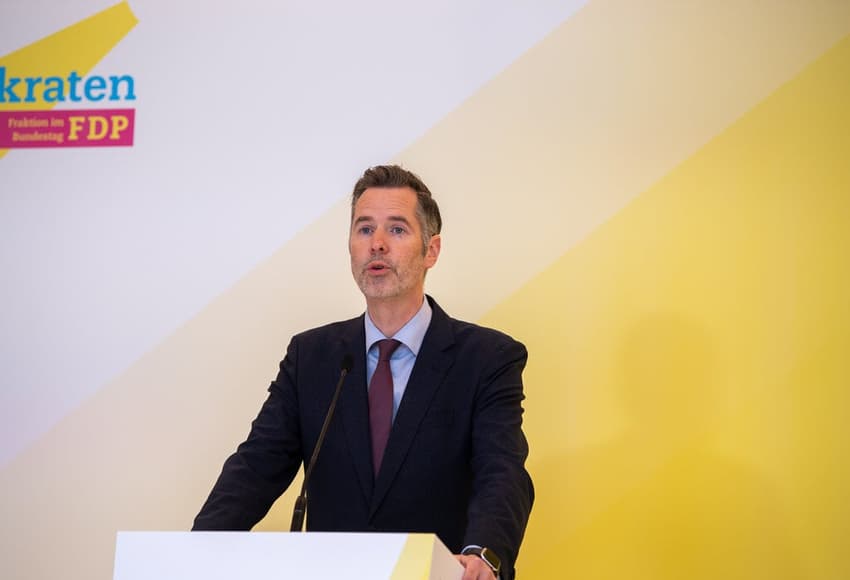German government rows over how to plug €60 billion funding gap

Germany's coalition is rowing over how to fund climate protection measures after a court ruled the government broke debt rules, leaving a €60 billion hole in next year's budget.
The Federal Constitutional Court ruled last week that the coalition had flouted debt brake rules, upending its spending plans.
It resulted in €60 billion having to be pulled from the government's 'Climate and Transformation Fund', leaving the coalition, made up of the Social Democrats (SPD), Greens and Free Democrats (FDP), looking for ways to make savings and prioritise spending.
READ ALSO: Why a climate court struck down a €60 billion fund for climate change
The pro-business FDP has advocated cutting social welfare to fund the budget and has rejected the idea of tax increases.
"The coalition is called upon to find solutions to further consolidate public finances. In doing so, we must also discuss where the welfare state can make its contribution to budget consolidation," FDP parliamentary group leader Christian Dürr told the Funke Mediengruppe newspapers.
"The fact is that money must first be generated before it can be distributed," he added, saying that tax hikes would be the wrong way to stimulate the economy.
But Green parliamentary group leader Katharina Dröge warned against reacting to the court's judgement with social cuts.
"In our view, cuts in the social sector are out of the question because this would jeopardise social cohesion, especially in times of high inflation," Dröge said. A reform of Germany's debt brake, on the other hand, "makes economic sense in principle", she argued.
Germany's constitutionally enshrined debt brake limits annual new borrowing to 0.35 percent of gross domestic product.
The brake was suspended from 2020-2022 to deal with the pandemic and energy crisis - a move that is allowed during emergencies - but came back into force this year.
READ ALSO: Germany 'to borrow over €45 billion' in 2023 to combat energy crisis
"We Greens have been campaigning for many years for the debt brake to be reformed, as it is economically ill-conceived," Dröge told the Tagesspiegel.
She said the rule was slowing down investments and was "in its current form a burden for Germany as a business location".
Ahead of the ruling, the Constitutional Court had been examining accusations from the main opposition CDU party that Chancellor Olaf Scholz's coalition has acted in breach of the debt brake.
The court case centred on a change to accounting rules for funds outside the main budget that was implemented last year by the centre-left-led coalition, giving it more room for deficit spending outside times of crisis.
In particular, it looked at a decision to transfer €60 billion of loan authorisations that had been part of pandemic support programmes to a fund aimed mainly at fighting climate change.
Comments
See Also
The Federal Constitutional Court ruled last week that the coalition had flouted debt brake rules, upending its spending plans.
It resulted in €60 billion having to be pulled from the government's 'Climate and Transformation Fund', leaving the coalition, made up of the Social Democrats (SPD), Greens and Free Democrats (FDP), looking for ways to make savings and prioritise spending.
READ ALSO: Why a climate court struck down a €60 billion fund for climate change
The pro-business FDP has advocated cutting social welfare to fund the budget and has rejected the idea of tax increases.
"The coalition is called upon to find solutions to further consolidate public finances. In doing so, we must also discuss where the welfare state can make its contribution to budget consolidation," FDP parliamentary group leader Christian Dürr told the Funke Mediengruppe newspapers.
"The fact is that money must first be generated before it can be distributed," he added, saying that tax hikes would be the wrong way to stimulate the economy.
But Green parliamentary group leader Katharina Dröge warned against reacting to the court's judgement with social cuts.
"In our view, cuts in the social sector are out of the question because this would jeopardise social cohesion, especially in times of high inflation," Dröge said. A reform of Germany's debt brake, on the other hand, "makes economic sense in principle", she argued.
Germany's constitutionally enshrined debt brake limits annual new borrowing to 0.35 percent of gross domestic product.
The brake was suspended from 2020-2022 to deal with the pandemic and energy crisis - a move that is allowed during emergencies - but came back into force this year.
READ ALSO: Germany 'to borrow over €45 billion' in 2023 to combat energy crisis
"We Greens have been campaigning for many years for the debt brake to be reformed, as it is economically ill-conceived," Dröge told the Tagesspiegel.
She said the rule was slowing down investments and was "in its current form a burden for Germany as a business location".
Ahead of the ruling, the Constitutional Court had been examining accusations from the main opposition CDU party that Chancellor Olaf Scholz's coalition has acted in breach of the debt brake.
The court case centred on a change to accounting rules for funds outside the main budget that was implemented last year by the centre-left-led coalition, giving it more room for deficit spending outside times of crisis.
In particular, it looked at a decision to transfer €60 billion of loan authorisations that had been part of pandemic support programmes to a fund aimed mainly at fighting climate change.
Join the conversation in our comments section below. Share your own views and experience and if you have a question or suggestion for our journalists then email us at [email protected].
Please keep comments civil, constructive and on topic – and make sure to read our terms of use before getting involved.
Please log in here to leave a comment.